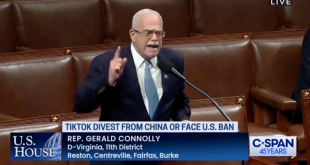WASHINGTON — President Biden on Friday will order a 180-day study of adding seats to the Supreme Court, making good on a campaign-year promise to establish a bipartisan commission to examine the potentially explosive subjects of expanding the court or setting term limits for justices, White House officials said.
The president acted under pressure from activists pushing for more seats to alter the ideological balance of the court after President Donald J. Trump appointed three justices, including one to a seat that Republicans had blocked his predecessor, Barack Obama, from filling for almost a year.
The result is a court with a stronger conservative tilt, now 6 to 3, after the addition of Mr. Trump’s choices, including Justice Amy Coney Barrett, who was confirmed to replace Justice Ruth Bader Ginsburg just days before last year’s presidential election.
But while Mr. Biden, a former chairman of the Senate Judiciary Committee, has asserted that the system of judicial nominations is “getting out of whack,” he has declined to say whether he supports altering the size of the court or making other changes — like imposing term limits — to the current system of lifetime appointments.
It is not clear that the commission established by Mr. Biden will by itself clarify his position. Under the White House order establishing it, the commission is not set to issue specific recommendations at the end of its study — an outcome that is likely to disappoint activists.
In his executive order on Friday, the president will create a 36-member commission charged with examining the history of the court, past changes to the process of nominating justices, and the potential consequences to altering the size of the nation’s highest court.
The panel will be led by Bob Bauer, who served as White House counsel for Mr. Obama, and Cristina Rodriguez, a Yale Law School professor who served as deputy assistant attorney general in the Office of Legal Counsel under Mr. Obama.
Progressives say that Republicans unfairly gained an advantage on the court by blocking Mr. Obama’s nomination of Judge Merrick B. Garland in 2016, and they see adding seats to the court, setting term limits or instituting other changes as a way to offset the power of any one president to influence its makeup. Conservatives have denounced the effort as “court-packing” similar to the failed effort by President Franklin D. Roosevelt in the 1930s.
The issue of whether to alter the size of the court, which has been set at nine members since just after the Civil War, is highly charged, particularly when Congress is almost evenly divided between the two parties. An attempt by Mr. Biden to increase the number of justices would require approval of Congress and would be met by fierce opposition.
The commission is intended to provide a forum to debate the issue that is protected from the passions that will continue to rage in the political arena, according to people familiar with Mr. Biden’s intentions.
The president understands, they said, that changes to the size of the court, or limitations on the length of time that a justice can serve, would be “reforms for the ages” that would have far-reaching implications for the courts for decades, not just during Mr. Biden’s time in office.
During his campaign for president, activists urged Mr. Biden to promise that he would expand the court as a way of countering the conservative mark that Mr. Trump was able to put on the institution. In addition to Justice Barrett, Mr. Trump also appointed Justices Brett M. Kavanaugh and Neil M. Gorsuch.
“There’s growing recognition that the Supreme Court poses a danger to the health and well-being of the nation and even to democracy itself,” said Aaron Belkin, the director of the group Take Back the Court. “A White House judicial reform commission has a historic opportunity to explain the gravity of the threat and to help contain it by urging Congress to add seats, which is the only way to restore balance to the court.”
Mr. Biden has refused to clarify his view on the issue and instead, in an interview on “60 Minutes” in October, promised to create a commission.
“I will ask them to, over 180 days, come back to me with recommendations as to how to reform the court system, because it’s getting out of whack,” he told Norah O’Donnell of CBS News.
Mr. Biden may get his own chance to shape the court this year if Justice Stephen G. Breyer retires at the end of the current term. Justice Breyer, 82, is the oldest member of the court and the senior member of its three-justice liberal wing. Progressive groups are becoming increasingly aggressive in demanding that he step aside while Democrats still control the Senate and the confirmation process.
But Justice Breyer warned this week that efforts to expand the court for political reasons could undermine the trust that the public has in the court and the decisions that it makes on important issues.
“I hope and expect that the court will retain its authority,” he said. “But that authority, like the rule of law, depends on trust, a trust that the court is guided by legal principle, not politics. Structural alteration motivated by the perception of political influence can only feed that perception, further eroding that trust.”
Activists who say a larger court would give Mr. Biden the chance to appoint a number of liberal justices may be disappointed by his commission. People familiar with its charge from the president said the group will avoid making any recommendations to Mr. Biden or lawmakers.
Instead, the panel of scholars, lawyers, political scientists and former judges will produce a research paper designed to be an authoritative analysis of the issue. The goal, the people said, is not to settle on an answer, but to provide Mr. Biden, members of Congress and the public an evaluation of the risks and benefits of making changes to the court.
In a statement to be released Friday, the White House said the commission would examine “the genesis of the reform debate and the court’s role in the constitutional system; the length of service and turnover of justices on the court; the membership and size of the court; and the court’s case selection, rules, and practices.”
The commission’s members include liberal scholars like Laurence H. Tribe, a professor emeritus at Harvard Law School and a leading progressive voice in the legal community, and Caroline Fredrickson, the former president of the American Constitution Society.
But progressives may balk at some of the conservative members of the commission. They include: Jack Goldsmith, a Harvard Law School professor who was a top Justice Department official under President George W. Bush; Adam White, a resident scholar at the American Enterprise Institute and a professor at George Mason University’s Antonin Scalia Law School; and Keith E. Whittington, a professor of politics at Princeton University who takes an “originalist” view of the Constitution.
People familiar with Mr. Biden’s selections for the commission said they expected some members to offer evidence promoting the benefits of making changes to the court, while others would emphasize the costs or consequences of altering the current method of selecting justices. Those discussions will be presented in the report, which is set to be finished in October.
In his order, Mr. Biden instructed the commission to hold public hearings on the issue and to accept testimony and submissions from other legal experts, organizations and members of the public who want to weigh in.
Among the questions that he wants answered: How should the strengths and weaknesses of proposals to expand the court be evaluated? Would expansion require other reforms, such as the creation of a panel system for sittings? How does the history of efforts to expand or contract the size of the court bear on the questions being debated?
 Top Naija News: Nigerian News, Breaking News Nigeria and World News Top Naija News is a daily news publication in Nigeria, delivering the latest breaking news in Nigeria and around the world.
Top Naija News: Nigerian News, Breaking News Nigeria and World News Top Naija News is a daily news publication in Nigeria, delivering the latest breaking news in Nigeria and around the world.


